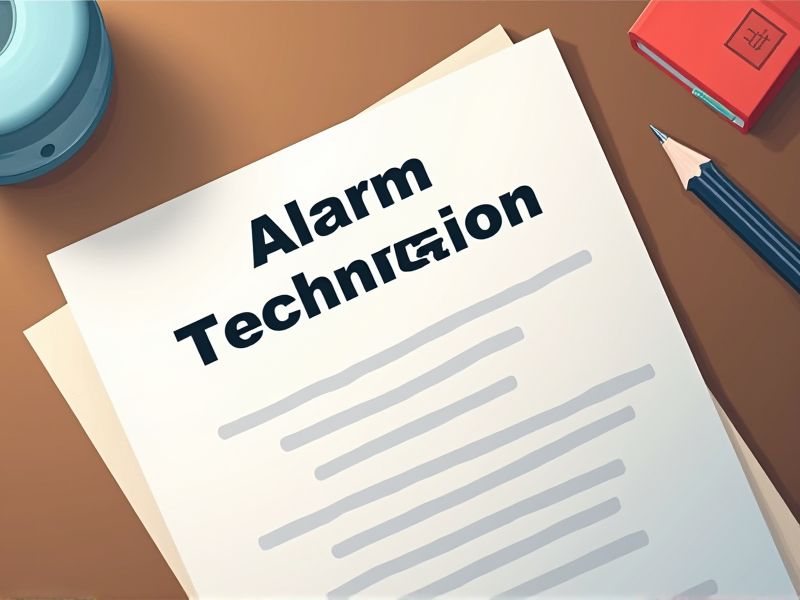
Alarm Technicians play a pivotal role in maintaining security systems that protect life and property. Proper certification is essential to ensure they possess the technical knowledge and skills necessary to install and maintain complex alarm systems. These certifications also serve to meet legal standards and industry regulations, which enhance trust and credibility. Here are some important certifications you may need as an Alarm Technician.
NICET Level I Certification in Intrusion Alarm Systems
Obtaining the NICET Level I Certification in Intrusion Alarm Systems ensures an alarm technician has a foundational understanding of industry standards and safety protocols. Certification often leads to increased job prospects as employers tend to prefer hiring certified technicians. It also provides a benchmark for evaluating and improving technical competencies in the field. Holding this credential can sometimes result in higher pay, reflecting the technician's verified skills and commitment to professional development.
NICET Level I Certification in Fire Alarm Systems
NICET Level I Certification in Fire Alarm Systems verifies the technician's foundational knowledge and competency in handling basic fire alarm tasks. Certification enhances the technician's credibility and employability by meeting industry standards. Employers often require NICET certification as it ensures a standard level of expertise and commitment to professional development. Certification assists in minimizing errors and improving the reliability and safety of fire alarm system installations.
ESA Certified Alarm Technician
Having ESA Certified Alarm Technician credentials ensures the technician possesses standardized knowledge and skills. Certification increases trust with clients and reduces the likelihood of installation errors. Proper training typically results in better system reliability and fewer false alarms. Certified technicians can also help ensure compliance with industry regulations and standards.
OSHA 10-Hour Construction Safety Certification
The OSHA 10-Hour Construction Safety Certification provides essential knowledge about identifying and mitigating workplace hazards, which is crucial for an alarm technician who frequently works on construction sites. Alarm technicians often work in environments where they encounter electrical systems, making safety training vital to prevent accidents and ensure compliance with safety regulations. This certification also raises awareness about personal protective equipment and emergency response protocols, reducing the likelihood of injury on the job. Employers value this certification because it demonstrates a technician's commitment to maintaining a safe work environment, aligning with industry standards and regulatory requirements.
First Aid/CPR Certification
An alarm technician often works in environments where electrical hazards or emergencies may occur, making first aid/CPR certification crucial for immediate response. Accidents can happen during the installation or maintenance of alarm systems, and having first aid skills can mitigate harm. Properly trained technicians can ensure a safer workplace for themselves and their coworkers by quickly addressing injuries. In life-threatening situations, CPR certification empowers technicians to provide critical care until professional medical help arrives.
Low Voltage Systems Installation Certification
Acquiring Low Voltage Systems Installation Certification ensures alarm technicians possess the necessary knowledge to safely and effectively handle electrical components within security systems. The certification process educates technicians on complying with industry standards, reducing the risk of improper installation that could lead to malfunctions or safety hazards. This certification can enhance an alarm technician's credibility with employers and clients, potentially leading to more job opportunities. Many jurisdictions require this certification to legally perform installations, ensuring public safety and system reliability.
Electrical Safety Compliance Certification
Electrical Safety Compliance Certification is necessary for alarm technicians as it ensures adherence to safety regulations, reducing the risk of electrical hazards during installations and maintenance. Certification guarantees that technicians possess the requisite knowledge to handle electrical components safely, minimizing potential harm to themselves and clients. Acquiring this certification enhances the technician's credibility and trustworthiness, leading to higher customer satisfaction and potential business growth. Regulations often mandate such certifications to ensure consistent industry standards and protect public safety.
Security Industry Authority (SIA) License
To legally work as an alarm technician in the UK, possessing a Security Industry Authority (SIA) license is mandated, ensuring compliance with regulatory standards. This requirement exists to maintain high levels of professionalism and trust in the security industry, as it screens technicians for criminal background and industry-relevant qualifications. By holding an SIA license, alarm technicians demonstrate their commitment to security and safety practices, enhancing reliability in their work. Consequently, customers and employers gain confidence in the service provided, knowing it meets national security standards.
CompTIA A+ Certification
Holding a CompTIA A+ certification can enhance an alarm technician's understanding of hardware and software components, which is essential for integrating alarm systems with modern networked environments. It provides foundational knowledge in troubleshooting and problem-solving, aiding technicians in diagnosing issues effectively. Employers often seek certified technicians as they can ensure installation and maintenance of alarm systems meet industry standards. The certification validates one's skills in IT security, crucial for protecting alarm systems from cyber threats.
Building Automation Systems (BAS) Certification
Building Automation Systems (BAS) certification enhances an alarm technician's ability to handle complex integration of various systems, such as HVAC, security, and lighting, leading to increased efficiency and reliability. Competence in BAS ensures compliance with industry standards, thereby reducing the risk of system failures and ensuing safety hazards. Certification reflects a technician's up-to-date knowledge on technological advancements, making them more adaptable to evolving client needs. The certification can also improve career prospects and job security due to increased demand for skilled individuals capable of operating sophisticated BAS platforms.
Summary
By earning certifications, you can enhance your credibility as an alarm technician, leading to increased trust from clients and employers. Certification often results in improved job prospects and potential for higher income due to specialized skills. Clients tend to prefer certified technicians, which can lead to more job opportunities and repeat business for you. Overall, certification demonstrates a commitment to quality and industry standards, potentially increasing your career advancement opportunities.
